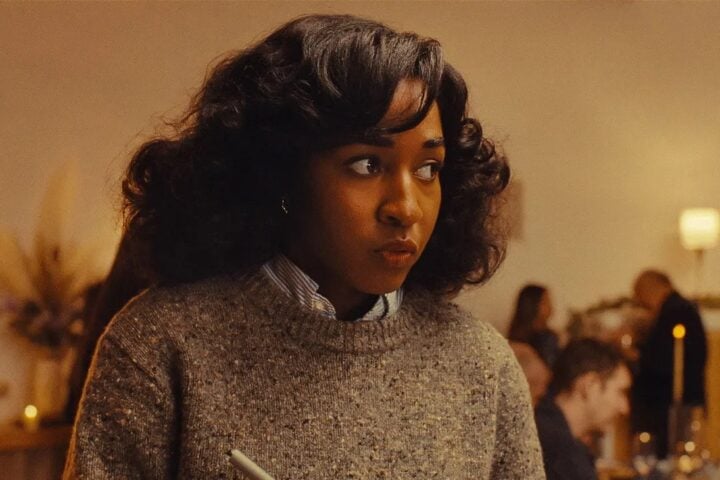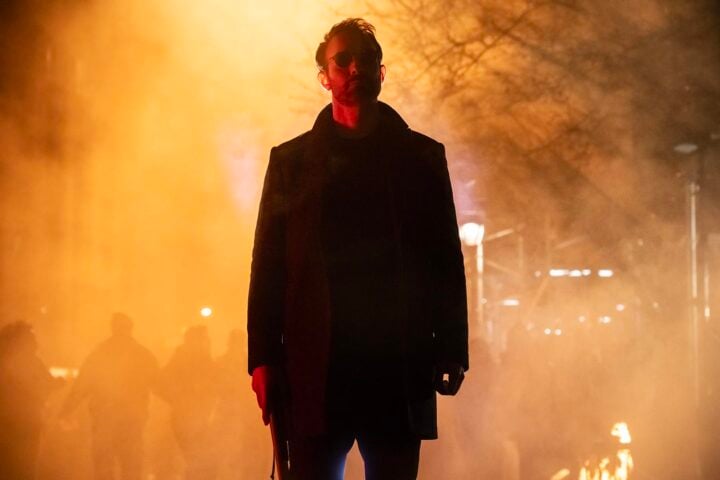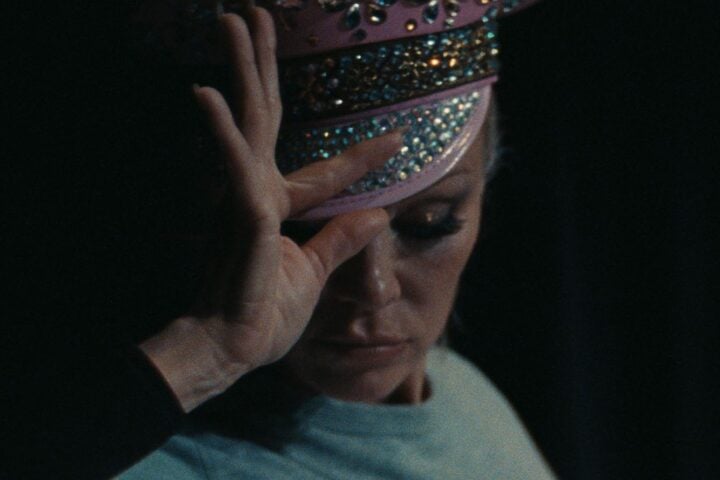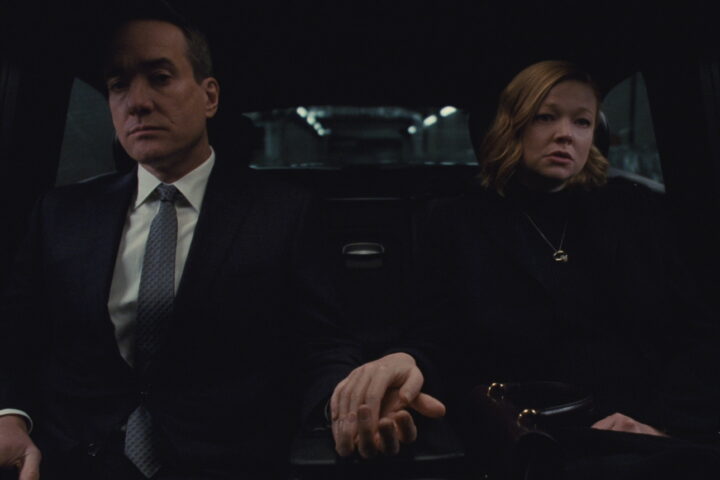Christopher Storer’s saga of a restaurant family wears its love for Chicago on its au-jus-stained sleeves. The Bear’s second season takes every conceivable opportunity to bridge scenes with montages of the Windy City’s architectural glory and charmingly aged infrastructure. It also drops in quotes from The Blues Brothers and, in its deftest homage to America’s third-largest metropolis, a decent portion of its score from Michael Mann’s Thief.
There’s more than a tinge of underdog defiance to The Bear’s Chicago pride—implicitly directed, as such pride so often is, eastward. “This is way better than New York,” a fine-dining customer is pointedly overheard saying in the season’s seventh episode, “Forks.” The show’s overarching story, after all, concerns a high-end chef, Carmy Berzatto (Jeremy Allen White), who’s relocated from the Big Apple to his native Chicago. At times, the propagandizing threatens to be a bit much, but then again, the show’s in-your-face trumpeting of the virtues of Pequod’s Pizza pretty much accords with its tense, often abrasively comic depiction of life in front of a stove.
As Carmy gives his dearly departed brother’s Italian beef joint a makeover, The Bear ramps up its trademark tension while also cranking up the sweetness, as the bonds between the staff deepen. The Original Beef, simply known as The Beef, has closed in order to be transformed into The Bear. In lockstep, the series also shifts gears, sending Tina (Liza Colón-Zayas) and Ebraheim (Edwin Lee Gibson) to a local culinary school and Marcus (Lionel Boyce) on a journey to Copenhagen to further hone his pastry skills. And while he’s across the pond, Marcus continues to bond over Zoom with sous chef Sydney (Ayo Edebiri), who’s back in Chicago working on The Bear’s menu—and through her frustrations with Carmy’s shortcomings.
In contrast to the first season’s relentless push through a few intense weeks at a struggling fast-food joint, season two savors the sights, sounds, and, indirectly, tastes that its characters discover on their various journeys. There’s a sense that The Bear feels newly free to wax contemplative, dwelling in its quieter moments on the way experiences are encoded in the design of a dish, from Marcus’s encounter with an injured cyclist in Copenhagen to Sydney’s research tour of Chicago’s dining scene in the third episode, “Sundae.”
The new season can feel anarchic. Some episodes are under half an hour and the longest breaches the hour mark, while the see-sawing between Ted Lasso-style positivity to Sopranos-grade acrimony results in tonal whiplash. But this impression of lopsidedness, like a modernist painting or a chic dish, is a calculated effect. And it starts on the level of the individual sequence, as almost every scene in the kitchen—depicted in claustrophobic close-ups—seems equally likely to erupt into a shouting match or an eruption of surrogate-family affection. The Bear’s famous tight shots serve as much more than intensifiers, with the focus on the actors’ often turmoil-ridden faces actually the key to its humanizing portrait of the travails of cooperative creation.
The centerpiece of the second season is undoubtedly the sixth episode, “Fishes,” which flashes back five years to introduce us to Carmy’s extended family and the decisive Christmas dinner that alienated the neurotic bunch from one another. The episode is emblematic of the season’s strongest and weakest points: Its interweaving conflicts and intimate close-ups add up to a deeply empathetic portrait of the unsteady egos that often underly outsized personalities, while the showiness of its bevy of one-off appearances—among them, Bob Odenkirk as “uncle” Lee, Sarah Paulson as cousin Michelle, and John Mulaney as Michelle’s husband, Stevie—tends to distract from the story’s otherwise sharp, compelling dramedy.
At the lead of the motley crew of recognizable faces is Jamie Lee Curtis as Donna, the mother of Carmy, Nat (Abby Elliott), and Mikey (Jon Bernthal) and ersatz mom for Mikey’s BFF Richie (Ebon Moss-Bachrach). An accomplished cook as well as a volatile woman who looks for any excuse to reject the very love and affirmation she strives for, Donna immediately tracks as the tone-setter for the Berzatto family interactions we’ve seen to this point on the series. Curtis’s performance transcends the immediate impression that her role is a glorified cameo, conveying here and in a later appearance the full sense of a woman in the grip of mental illness.
“Fishes” sets the stage for the opening of the restaurant in episode 10, “The Bear,” to be a chance at reconciliation for the family. By then, Carmy and Sydney have spent much of the season convincing Nat to permanently come on board to run The Bear’s finances and push Richie, still traumatized by his divorce from his wife (Gillian Jacobs) and Mikey’s death, to straighten up. But, typified by its willingness to get lost in a good montage of Chicago or Copenhagen, The Bear is at least as interested in mood as it is in plot. The season is structured less around storylines than around feelings—and a much wider variety of them than in the first season.
This includes, surprisingly, romance. Carmy reconnects with an old crush, Claire (Molly Gordon), in episode two, “Pasta,” which quickly blossoms into a love affair. The beautiful, wry Claire reassures Carmy that “nobody’s counting shoes” when he confesses in “Sundae” that he’s always waiting for the proverbial other shoe to drop. The stability that she reflexively offers seems almost too good to be true. That’s clearly what Carmy is thinking, anyway, behind White’s expressive baby blues—especially after the restaurant’s primary investor, Jimmy (Oliver Platt), raises his eyebrows at his newphew’s budding romance with Claire.
Despite all the personal growth going on around him, the boyishly cute but deeply damaged master chef finds it difficult to escape the more destructive tendencies of his extended family, as well as his own psyche. What makes the sometimes nerve-wracking, often funny, and meticulously constructed second season of The Bear much more than clever propaganda for Chicago fine dining is the core observation realized in Carmy’s character that our successes and our hindrances often share a source: our infuriatingly complex selves.
Since 2001, we've brought you uncompromising, candid takes on the world of film, music, television, video games, theater, and more. Independently owned and operated publications like Slant have been hit hard in recent years, but we’re committed to keeping our content free and accessible—meaning no paywalls or fees.
If you like what we do, please consider subscribing to our Patreon or making a donation.





